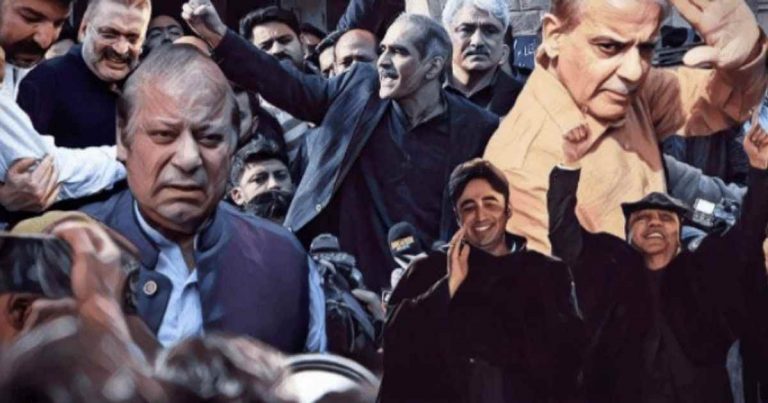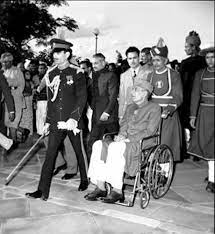
The only thing that has perhaps happened is the emergence of Pakistan’s military as the most organized ‘political party’ of country – Bangladeshi analyst.
Pakistan’s political decomposition began in 1954 when Pakistan’s first constituent assembly was dissolved by Pakistan’s civil-bureaucrat turned Governor General Malik Ghulam Mohamad.
Abdul Mannan
It has been seventy five years since the British left this sub-continent and an artificial country based on a queer ‘Two Nation Theory’, called Pakistan was created. In the last seventy five years nothing in Pakistan seems to have changed for the better, especially in politics of Pakistan. However, the only thing that has perhaps happened is the emergence of Pakistan’s military as the most organized ‘political party’ of Pakistan. Since its birth, no government or its Prime Minister in Pakistan could serve its full five year term. The country’s politics was mostly dominated by the army throughout its history. When Imran Khan was voted to power and took over as the 22nd Prime Minister of Pakistan on 18 August 2018 some optimists saw some glitter of hope but soon the hopes were dashed to pieces when Imran Khan was deposed by the Pakistan Army on 10 April 2022, installing Shabaz Sharif the brother of another deposed former Prime Minister Nawaz Sharif in power. Shabaz still survives as he is just a façade of the military face behind him. If he is not playing to the tune of the Pakistan army he may also be booted out without any remorse from any quarter. It is not only the army that has played a villainous role in Pakistan’s politics but its judiciary also has its own contribution to making Pakistan what it is today – a country on the brink of collapse, both economically and politically.
That healthy and normal politics has no place in Pakistan
Pakistan’s political decomposition began in 1954 when Pakistan’s first constituent assembly was dissolved by Pakistan’s civil-bureaucrat turned Governor General Malik Ghulam Mohamad on the advice of the short-sighted civil-military bureaucracy, the ever powerful driving force of Pakistan’s politics. The President (Speaker) of the Assembly, Maulavi Tamizuddin Khan, elected parliament member from Faridpur district of undivided Bengal in the election of 1946 tried to save what was left of Pakistan’s future politics but his efforts were torpedoed by the Chief Justice of the country’s Federal Court, Justice Muhammad Munir who ruled that the dissolution of the Parliament was justified invoking for the first time in the judicial history of the sub-continent, the maxim of ‘Doctrine of Necessity.’ Since then there was no looking back for Pakistan’s politics.

That healthy and normal politics has no place in Pakistan, has been demonstrated by the farewell speech of the immediate past Chief of Army Staff, General Qamar Javed Bajwa given to the formation commanders and senior officers of the Pakistan Army in Islamabad on 28 November 2022 after being six years in office. In his departing speech Bajwa assured the public ‘the army has learnt a lesson and would henceforth refrain from trying to influence the (non-existent) democratic process’ which unfortunately the public in Pakistan refuses to accept or believe looking back into the seventy five years of its murky history.
Out of context Bajwa also claimed that in order to ‘correct the record I want to correct the record,…the fall of East Pakistan was not a military but a political failure.’ Bajwa wanted to sanitize the Pakistan Army from their role in Bangladesh in 1971 and accuse the politicians for whatever has happened in the then East Pakistan, now Bangladesh. Till now no politicians in Pakistan except Bhutto’s son and Pakistan’s Foreign Minister Bilawal Bhutto Zardari rejected the claim of Bajwa. On last Wednesday Bilawal said in a party rally in Karachi that ‘the debacle in 1971 was in fact a military failure that had brought a host of challenges for politicians.’
According to Bajwa the number of Pakistani soldiers fighting was not 92,000 but 34,000 and others were in different government departments. As per Bajwa’s statement Pakistani soldiers were confronting 250,000 Indian soldiers and 200,000 members of Mukti Bahini. Bajwa forgot, perhaps willingly, that alongside with the Pakistan army they had active local accomplices, namely Jamaat-e-Islami, Al-Badars, Al-Shams and East Pakistan Civil Armed Forces. Most of these non-formal armed accomplices of the Pakistan army were in the payroll of the Pakistan government. Besides, Pakistan was profusely supported both militarily and diplomatically by two superpowers, USA and China. What Bajwa said after fifty one years of the Fall of Dhaka has been taken by the military and political historians of the sub-continent, Pakistan included, by surprise. It may be a matter of surprise to many that in Pakistan the history of the country virtually begins from 1972 and not from 1947. Most of the present generation of Pakistan are not aware that once Bangladesh was part of Pakistan and there was a disastrous war for Pakistan in Bangladesh in 1971.
From Bajwa’s speech and his statements it seems the former Chief of Army Staff is sleepwalking by blaming the politicians for the breakup of Pakistan and emergence of Bangladesh as an independent nation in 1971. For those of our generation who have been witnesses of the events that unfolded in Bangladesh in 1970 or 1971 to them it was not the politicians, except Pakistan People’s Party (PPP) Chairman Zulfiqar Ali Bhutto who did not endorse a peaceful solution to the political crisis in Bangladesh in 1971. Before the election of 1970 it was predicted by Pakistan’s military intelligence that no political party of Pakistan would get a clear majority in the parliament and in the end the country would have a hung parliament. Bajwa also forgot that when General Yahiya Khan announced the election of 1970 he also announced a Legal Framework (LFO) which in clear terms said that the elected parliament will only be responsible for drafting of a Constitution for Pakistan and it has to be endorsed by the General and if according to him it does not meet his standard (?) he will dissolve the Parliament and later announce another election. So it is evident the existence of a United Pakistan did not rest on the desire of the politicians but on the whims of a single person -Pakistan’s military dictator General Yahiya Khan. It must also be remembered that the election of 1970 was held when the country was under Martial Law.
When Awami League pulled a stunning victory winning 167 seats out of allotted 169 in Bangladesh in a parliament of 300 it was expected that the majority party Awami League will form the government in the Centre and Parliament will be the hub of all decisions regarding the Constitution of Pakistan. March 3, 1971 was fixed as the day of sitting of the Parliament in Dhaka and politicians from the then West Pakistan began to arrive in Dhaka. It was only Bhutto who refused to come to Dhaka as he knew as minority party leader (PPP won in only 81 seats) he may not have a comfortable position in the parliament. Instead he remained busy conspiring with Yahiya Khan how to annul the results of the 1970 election. On the advice of Bhutto and other senior civil-military bureaucracy of Pakistan Yahiya Khan on 1 March unilaterally cancelled the scheduled sitting of the Parliament in Dhaka on 3 March triggering a countryside protest and uproar in Bangladesh. Bangabandhu, the Chief of Awami League virtually assumed the role of civil administrator in Bangladesh and only when things looked grim and was going out control of Pakistan’s military government did Yahiya Khan decided to come to Dhaka to discuss the crisis with political leaders of Bangladesh which was seen as deceptive step by many historians both in Pakistan and Bangladesh that enabled Yahiya Khan and his military machinery to strengthen their military might in Bangladesh so that when time is ripe they can strike on the people of Bangladesh with full force.
General Yahiya Khan reached Dhaka on 15 March 1971 with his senior military officials including senior army officers like Gul Hassan and Peerzada. Lt. General Tikka Khan known as the butcher of Balochistan was already in Dhaka as the Governor replacing Lt. General Sahibzada Yaqub Khan who was considered too soft towards the people of East Pakistan. Later came General Rao Farman Ali the man known as the mastermind of the killing of the intellectuals during the nine month War of Liberation. Already Lt. General Khadim Hossain Raja was given the charge of unleashing the military operations in Bangladesh to annihilate the Bengalese from this country.
While Yahiya Khan kept the local and other politicians from the then West Pakistan busy in discussing to ‘find out ways’ to diffuse the tension in Bangladesh he was actually buying time to bring plane load of forces from Pakistan and arms by ship to Chittagong port. Bangabandhu was aware of these events but he played his part as a visionary politician without making a first move to declare independence unilaterally so that the world would not dub him as a secessionist. Except Bhutto, other politicians also tried to hammer some sense into Yahiya and his cohorts but Yahiya Khan had already made up his mind.
While Yahiya Khan kept Bangabandhu and others busy in Dhaka in the name of dialogue Pakistan’s military officers travelled to all the cantonments and garrisons in Bangladesh with briefs detailing what to be done when the ‘Operation Search Light’ would be launched. It was planned that the Operation would first be launched in Dhaka and Brigadier Jahanjeb Arbab was put in charge of triggering the ‘Operation Search Light’ (Witness to Surrender, Brigadier Siddique Salik) on the night of 26 March 1970. The exact timing was fixed at midnight and Salik writes Arbab was getting impatient from 11.00 p.m. of 25 March to launch the attack on the unarmed civilians of Bangladesh. Where was Bajwa when these events were unfolding? What were the politicians doing during this time? Unfortunately Bajwa’s knowledge of history of 1971 is dotted with holes and it would be good for him to retake his history lesson from credible sources. Politicians are no saints or angels but the alternative to politicians are not Generals but only politicians.
This is the month of December, the month of our victory over the Pakistan army and their cohorts. Tributes to our heroes of 1971 who sacrificed their present for our better future.
_________________
The writer is an analyst and a commentator.
Courtesy: Daily Sun, Dhaka (Published on 3rd December, 2022)
[Sindh Courier has reproduced this article as part of its series of news reports and blogs about Pakistan published by foreign media. Sindh Courier has nothing to do with its content]